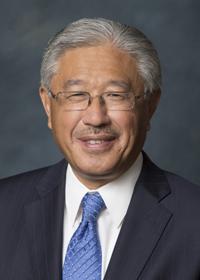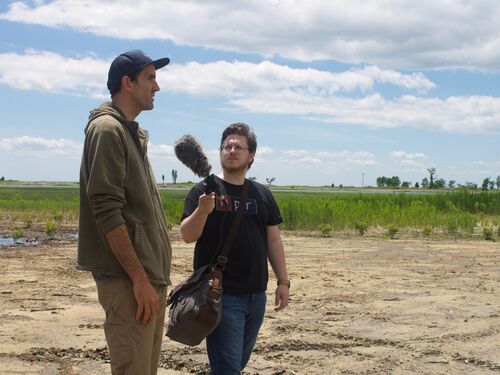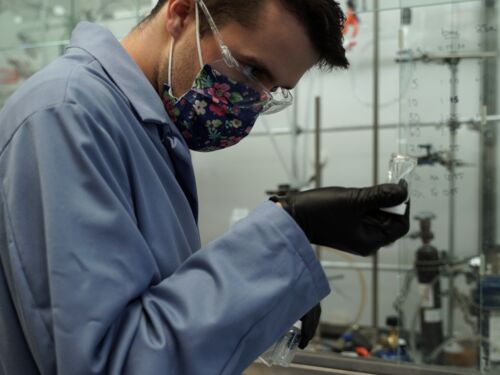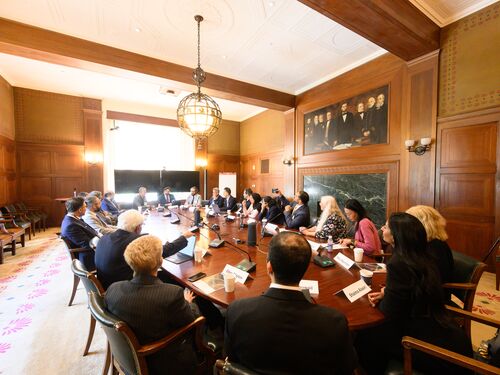Confronting a ‘Triple Existential Threat’ — NAM President Victor Dzau Discusses How Health and Medicine Can Respond to Current Crises
Feature Story
By Sara Frueh
Last update October 13, 2021

On Oct. 17-18 the National Academy of Medicine will hold its annual meeting with the theme of Crossing the Policy and Equity Chasm: Lessons from Compounding Health Crises. In advance of the meeting, NAM President Victor Dzau sat down to talk about these compounding crises.
Q. You have spoken about the “triple threat” society is now facing — the pandemic, systemic racism, and climate change. Can you expand on how these threats intersect?
Dzau: It’s more than a triple threat — it’s a triple existential threat; they threaten the very existence of us as the human race. All three problems are negatively impacting our society and our future.
If you take climate change and COVID-19, there is no doubt they’ve had disproportionate effects on the most vulnerable members of society. These threats are exacerbated by existing inequities and structural racism.
For example, we know well that people of color and those from low socio-economic strata have suffered disproportionately negative outcomes from the pandemic, in terms of infection rates, mortality rates, and negative impacts of economic outcomes due to physical distancing and other public health containment protocols. People in these groups are more likely to live in crowded conditions; many of them are front-line workers and don’t have the luxury of being able to work from home. Likewise, many are more likely to live in neighborhoods where they face a higher risk of exposure to the harmful consequences of climate change, such as flooding.
How did we get here? These problems stem from a long history of social injustice and inequity. When I use the word “racism” I use it broadly, not only in this country but everywhere. When we think about racism in our country — over hundreds and hundreds of years — we must also think about colonialism and bias and discrimination, all over the world.
When you create these terrible conditions for people, they’re more vulnerable to the impacts of COVID, climate change, and many other problems.
One commonality across all three existential threats is that they are issues in which humans can make a difference. We contribute to them, but we can also better prepare for them, mitigate them, and adapt to them.
Q: How can health and medicine in particular respond to those intersecting threats?
Dzau: For a long time, people have viewed the field of health and medicine in terms of caring for the sick and treating disease. But we in health and medicine have to broaden our thinking. Health and disease are impacted by everything around us. When we look at why people have more co-morbidities — factors that lead people to have more infection and death from COVID or climate or other factors — it’s related to the much larger issue of years of neglect, lack of access, lack of good health, and social disparities.
So my feeling is that we look at ourselves way too narrowly. We have to recognize the impact of the social determinants of health — poverty, housing, jobs, education, transportation, and so on. And the environment — from the quality of the air we breathe to the prevalence of extreme weather events — is now one of those social determinants. We’ll never tackle these threats and create good health without getting to the root causes and addressing these fundamental societal issues.
So we in health and medicine have a lot more to do, both as citizens and leaders of society, than simply taking care of the sick or talking about prevention and promotion. We need to address the societal inequity that we see, by speaking up and by acting and by leveraging our knowledge and our influence as one of society’s most trusted professions.
Q: What are some of the biggest lessons that U.S. public health leaders need to learn from the COVID-19 pandemic so far? How can we better manage future waves of this pandemic — and better prepare for future pandemics?
Dzau: If I were to summarize lessons learned, No. 1 is the importance of science. There’s absolutely no question that science is the solution to many of our problems; science has been critically important in all areas of pandemic response, from detection to surveillance to public health measures, and of course countermeasures — treatments, diagnostics, and vaccines.
Look at the great triumph of science in vaccines: Within 69 days of sequencing the virus, scientists came up with a vaccine to be tested in animals and humans. And 300 days after that, it reached phase 3 trials, which are the basis for approval and emergency authorization. And these vaccines are now saving millions of lives.
Science is absolutely important, but science has to be used properly and not politically.
Secondly, there are human dimensions that don’t receive enough attention — issues such as social cohesion and leadership. Countries that have responded well to the pandemic have had strong leaders with the courage to make decisions based on science and what is good for society, rather than politics. And you need citizenship — every person counts, and everyone has to do their share to help each other. Societies with weak or no social cohesion and which experience political polarization have fared much worse during the pandemic.
We need a much better public health system. Public health is fragmented in the United States. Public health systems at federal, state, and local levels are not working together under a single, coordinated umbrella. As a result, we’ve seen breakdowns in coordination and sharing information. The entire public health system, including the CDC, is underfunded, under-resourced, and understaffed. So we need a reboot of the entire public health system. We’ve also learned that data and information — and the ability to share it — is so important; we need a well-coordinated data system for the nation.
The good news is that the Biden administration recently released the American Preparedness Plan. They looked at all of the elements of preparedness — clarity in leadership, better surveillance, better data, and faster countermeasures. And globally, there are discussions about the need for global cohesion and solidarity, strategy and coordination, and a global system to finance preparedness.
Q: The COVID-19 pandemic was the latest example of racial inequities in health care and in health outcomes. What do you see as priority steps that the U.S. should take to improve racial equity in health care?
Dzau: The government needs to shine a light on the issue of equity — and how threats like climate change and air pollution disproportionately affect the marginalized and the poor and the vulnerable — and on the issue of environmental racism, which we’ve seen in situations like the water crisis in Flint, Michigan. Equity has to be front and center in everything we do.
We need to tackle the root causes of inequity. We first and foremost need to address the fundamental social determinants of health. We have to ensure access to high-quality health care for all, but also address the conditions in which people live, work, and play. We need to recognize structural racism as a root cause and tackle it.
I know the U.S. administration is trying very hard to address infrastructure and social issues, but we are way behind other countries.
Importantly, we must use this moment to drive action. COVID demonstrated very clearly that health crises can tank the economy of the world. People have been very reluctant to invest in health because they see it as a drain on the budget, but in fact, the global economy has already lost over $20 trillion due to the pandemic.
In comparison, the investment needed to improve global preparedness and response is in the billions of dollars. It’s really important to invest in preparedness before the next crisis, and understand that the investment needs to go beyond health to address societal issues.
Q. You’ve been involved in international efforts to fight the pandemic. What more needs to be done worldwide to get the pandemic under control? Do you think the U.S. and other wealthy countries are doing enough to help nations with fewer resources?
Dzau: There’s no question that we need global solidarity. As has been said, this pandemic will not end anywhere until it ends everywhere.
Take vaccine nationalism: Rich countries have hoarded billions of doses, while poor countries struggle with access to vaccines. Globally, 6.46 billion doses of vaccine have been administered, but only 2.5% of people in low-income countries have been vaccinated. At the current rate, the poorest countries will not be fully vaccinated until 2023. Until everyone has access to vaccines, we all face the threat of new virus variants with the possibility that the current vaccines will no longer protect against them.
So we need solidarity and multilateralism. We need to see these threats as collective problems to be solved together. Too much of the approach right now is that the rich countries are helping the poor countries — like a charity. It’s not about charity — it’s about the well-being and survival of every nation and everybody.
We need to have much better coordination and a good strategy for distributing treatments and vaccines. We have a long way to go. The global health system is fragmented just as the U.S. system is.
Is the U.S. doing enough? The U.S. has made an effort to help ensure vaccines reach people in the poorest countries. For example, the Biden administration has pledged to send more than 1 billion doses of vaccines overseas by the end of 2022.
But the U.S. can do a lot more. To end the pandemic, we need to move much faster to address the challenges of vaccine administration in poor counties. We cannot just send vaccines and hope they are administered. We need to provide resources and support to poor countries to ensure they are equitably and effectively distributed and delivered. We need to invest in preparedness and prevention.
To the U.S.’s credit, we just held a COVID summit — a side meeting — at the UN’s general assembly, and pledged with other countries to create a new financial intermediary fund (FIF) to prepare for future pandemics. But we need to see these pledges turn into action.
Q: Climate change will be among the subjects tackled at NAM’s annual meeting. Why is climate change a health issue? And what can health and medicine professionals do about it?
Dzau: Many people think of climate change as a looming environmental disaster, but it is a public health crisis. Twenty million people die each year globally from factors linked to climate change. If you look at what climate is doing to water, to food, to extreme temperatures, to hurricanes, and so on — we see the negative impact on health and lives lost. Climate change is a public health emergency.
There’s another reason we need to act: The U.S. health sector produces 8.5 percent of all carbon emissions in the country. So we should hold ourselves accountable and be part of the solution to reduce carbon emission.
That’s why the NAM launched the Grand Challenge on Climate Change and Human Health, which focuses on reversing the negative health and equity effects of climate change by activating the entire biomedical community, getting everyone involved, communicating and educating the public about climate and health, and driving changes through research, innovation, and policy.
Importantly, we are taking on the bold action of decarbonizing the health care sector. Our NAM Action Collaborative consists of interdisciplinary and multi-sectoral leaders from across the U.S. health system and the government who will identify and implement actions aimed at reducing the environmental impacts of the health sector and strengthening sustainability and resiliency. We must all come together to start measuring and tracking what we are emitting. We need to set goals together and hold ourselves accountable for reaching those goals. We need everyone to come together to change the way hospitals and health systems and health professionals practice to reduce our energy use and emissions. We also need to work with the private sector and the supply chain to decarbonize.
More like this
Discover
Events
Right Now & Next Up
Stay in the loop with can’t-miss sessions, live events, and activities happening over the next two days.
NAS Building Guided Tours Available!
Participate in a one-hour guided tour of the historic National Academy of Sciences building, highlighting its distinctive architecture, renowned artwork, and the intersection of art, science, and culture.



